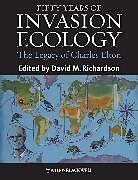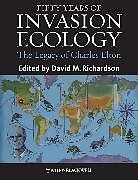Fifty Years of Invasion Ecology
Einband:
Fester Einband
EAN:
9781444335859
Untertitel:
The Legacy of Charles Elton
Genre:
Biologie
Autor:
David M. (Stellenbosch University) Richardson
Herausgeber:
Wiley-Blackwell
Anzahl Seiten:
456
Erscheinungsdatum:
24.12.2010
ISBN:
978-1-4443-3585-9
Informationen zum Autor David M. Richardson is Professor in the Department of Botany & Zoology at Stellenbosch University, South Africa, and Director of the DST-NRF Centre of Excellence for Invasion Biology. He is one of the most prolific authors in invasion ecology and was awarded the 2006 Hans Sigrist Prize and the 2012 John Hershel Medal of the Royal Society of South Africa for his work in this field. He is a Fellow of the Royal Society of South Africa, Member of the Academy of Science of South Africa and since 1998 has been Editor-in-Chief of the international journal Diversity and Distributions (Wiley-Blackwell). Klappentext Invasion ecology is the study of the causes and consequences of the introduction of organisms to areas outside their native range. Interest in this field has exploded in the past few decades. Explaining why and how organisms are moved around the world, how and why some become established and invade, and how best to manage invasive species in the face of global change are all crucial issues that interest biogeographers, ecologists and environmental managers in all parts of the world. This book brings together the insights of more than 50 authors to examine the origins, foundations, current dimensions and potential trajectories of invasion ecology. It revisits key tenets of the foundations of invasion ecology, including contributions of pioneering naturalists of the 19th century, including Charles Darwin and British ecologist Charles Elton, whose 1958 monograph on invasive species is widely acknowledged as having focussed scientific attention on biological invasions. Zusammenfassung Invasion ecology is the study of the causes and consequences of the introduction of organisms to areas outside their native range. This book brings together the insights of more than fifty authors to examine the origins! foundations! current dimensions and potential trajectories of invasion ecology. Inhaltsverzeichnis Contributors. Foreword. Introduction. PART 1 HISTORICAL PERSPECTIVES. 1 A world of thought: ' The Ecology of Invasions by Animals and Plants' and Charles Elton's life's work ( ROGER L. KITCHING ). 2 Charles Elton: neither founder nor siren, but prophet ( DANIEL SIMBERLOFF ). 3 The inviolate sea? Charles Elton and biological invasions in the world's oceans ( JAMES T. CARLTON ). 4 The rise and fall of biotic nativeness: a historical perspective ( MATTHEW K. CHEW AND ANDREW L. HAMILTON ). PART 2 EVOLUTION AND CURRENT DIMENSIONS OF INVASION ECOLOGY. 5 Patterns and rate of growth of studies in invasion ecology ( HUGH J. MACISAAC, RAHEL A. TEDLA AND ANTHONY RICCIARDI ). 6 Invasion ecology and restoration ecology: parallel evolution in two fi elds of endeavour ( RICHARD J. HOBBS AND DAVID M. RICHARDSON ). PART 3 NEW TAKES ON INVASION PATTERNS. 7 Biological invasions in Europe 50 years after Elton: time to sound the ALARM ( PETR PYEK AND PHILIP E. HULME ). 8 Fifty years of tree pest and pathogen invasions, increasingly threatening world forests ( MICHAEL J. WINGFIELD, BERNARD SLIPPERS, JOLANDA ROUX AND BRENDA D. WINGFIELD ). PART 4 THE NUTS AND BOLTS OF INVASION ECOLOGY. 9 A movement ecology approach to study seed dispersal and plant invasion: an overview and application of seed dispersal by fruit bats ( ASAF TSOAR, DAVID SHOHAMI AND RAN NATHAN ). 10 Biodiversity as a bulwark against invasion: conceptual threads since Elton ( JASON D. FRIDLEY ). 11 Soil biota and plant invasions: biogeographical effects on plant-microbe interactions ( RAGAN M. CALLAWAY AND MARNIE E. ROUT ). 12 Mutualisms: key drivers of invasions ... key casualties of invasions ( ANNA TRAVESET AND DAVID M. RICHARDSON ). 13 Fifty years on: confronting Elton's hypot...
Autorentext
David M. Richardson is Professor in the Department of Botany & Zoology at Stellenbosch University, South Africa, and Director of the DST-NRF Centre of Excellence for Invasion Biology. He is one of the most prolific authors in invasion ecology and was awarded the 2006 Hans Sigrist Prize and the 2012 John Hershel Medal of the Royal Society of South Africa for his work in this field. He is a Fellow of the Royal Society of South Africa, Member of the Academy of Science of South Africa and since 1998 has been Editor-in-Chief of the international journal Diversity and Distributions (Wiley-Blackwell).
Klappentext
Invasion ecology is the study of the causes and consequences of the introduction of organisms to areas outside their native range. Interest in this field has exploded in the past few decades. Explaining why and how organisms are moved around the world, how and why some become established and invade, and how best to manage invasive species in the face of global change are all crucial issues that interest biogeographers, ecologists and environmental managers in all parts of the world. This book brings together the insights of more than 50 authors to examine the origins, foundations, current dimensions and potential trajectories of invasion ecology. It revisits key tenets of the foundations of invasion ecology, including contributions of pioneering naturalists of the 19th century, including Charles Darwin and British ecologist Charles Elton, whose 1958 monograph on invasive species is widely acknowledged as having focussed scientific attention on biological invasions.
Inhalt
Contributors. Foreword. Introduction. PART 1 HISTORICAL PERSPECTIVES. 1 A world of thought: 'The Ecology of Invasions by Animals and Plants' and Charles Elton's life's work (ROGER L. KITCHING). 2 Charles Elton: neither founder nor siren, but prophet (DANIEL SIMBERLOFF). 3 The inviolate sea? Charles Elton and biological invasions in the world's oceans (JAMES T. CARLTON). 4 The rise and fall of biotic nativeness: a historical perspective (MATTHEW K. CHEW AND ANDREW L. HAMILTON). PART 2 EVOLUTION AND CURRENT DIMENSIONS OF INVASION ECOLOGY. 5 Patterns and rate of growth of studies in invasion ecology (HUGH J. MACISAAC, RAHEL A. TEDLA AND ANTHONY RICCIARDI). 6 Invasion ecology and restoration ecology: parallel evolution in two fi elds of endeavour (RICHARD J. HOBBS AND DAVID M. RICHARDSON). PART 3 NEW TAKES ON INVASION PATTERNS. 7 Biological invasions in Europe 50 years after Elton: time to sound the ALARM (PETR PYEK AND PHILIP E. HULME). 8 Fifty years of tree pest and pathogen invasions, increasingly threatening world forests (MICHAEL J. WINGFIELD, BERNARD SLIPPERS, JOLANDA ROUX AND BRENDA D. WINGFIELD). PART 4 THE NUTS AND BOLTS OF INVASION ECOLOGY. 9 A movement ecology approach to study seed dispersal and plant invasion: an overview and application of seed dispersal by fruit bats (ASAF TSOAR, DAVID SHOHAMI AND RAN NATHAN). 10 Biodiversity as a bulwark against invasion: conceptual threads since Elton (JASON D. FRIDLEY). 11 Soil biota and plant invasions: biogeographical effects on plant-microbe interactions (RAGAN M. CALLAWAY AND MARNIE E. ROUT). 12 Mutualisms: key drivers of invasions ... key casualties of invasions (ANNA TRAVESET AND DAVID M. RICHARDSON). 13 Fifty years on: confronting Elton's hypotheses about invasion success with data from exotic birds (TIM M. BLACKBURN, JULIE L. LOCKWOOD AND PHILLIP CASSEY). 14 Is rapid adaptive evolution important in successful invasions? (ELEANOR E. DORMONTT, ANDREW J. LOWE AND PETER J. PRENTIS). 15 Why reproductive systems matter for the invasion biology of plants (SPENCER C.H. BARRETT). 16 Impacts of biological invasions on freshwater ecosystems (ANTHONY RICCIARDI AND HUGH J. MACISAAC). 17 Expanding the propagule pressure concept to understand the impact of biological invasions (…

Leider konnten wir für diesen Artikel keine Preise ermitteln ...
billigbuch.ch sucht jetzt für Sie die besten Angebote ...
Die aktuellen Verkaufspreise von 6 Onlineshops werden in Realtime abgefragt.
Sie können das gewünschte Produkt anschliessend direkt beim Anbieter Ihrer Wahl bestellen.
Loading...
Die aktuellen Verkaufspreise von 6 Onlineshops werden in Realtime abgefragt.
Sie können das gewünschte Produkt anschliessend direkt beim Anbieter Ihrer Wahl bestellen.
| # | Onlineshop | Preis CHF | Versand CHF | Total CHF | ||
|---|---|---|---|---|---|---|
| 1 | Seller | 0.00 | 0.00 | 0.00 |
